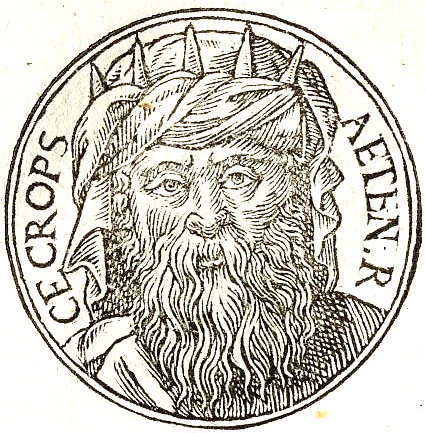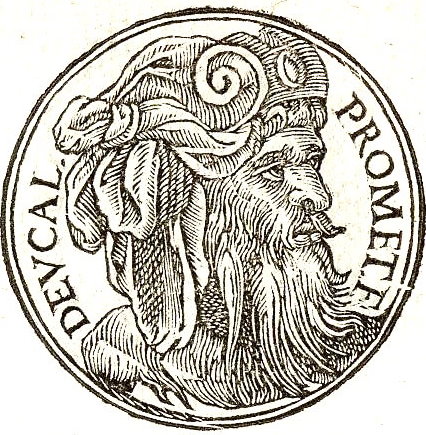|
Cranaus
In Greek mythology, Cranaus or Kranaos (;Ancient Greek: Κραναός) was the second Kings of Athens, King of Athens, succeeding Cecrops I, Cecrops I. Family Cranaus married Pedias, a Spartan woman and daughter of Mynes (mythology), Mynes, with whom he had three daughters: Cranaë, Cranaechme, and Atthis (mythology), Atthis. Atthis gave her name to Attica after dying, possibly as a young girl,Apollodorus, 3.14.5; Pausanias (geographer), Pausanias, ''Graeciae Descriptio'' 1.2.6; Strabo, ''Geographica'' 9.1.18 although in other traditions she was the mother, by Hephaestus, of Erichthonius of Athens, Erichthonius. Rarus was also given as a son of Cranaus. Reign Cranaus was supposed to have reigned for either nine or ten years and was an autochthon (ancient Greece), autochthon (born from the earth), like his predecessor. During his reign, the flood of the Deucalion story was thought to have occurred. In some accounts, Deucalion was said to have fled Lycorea to Athens with his sons ... [...More Info...] [...Related Items...] OR: [Wikipedia] [Google] [Baidu] |
Amphictyon
Amphictyon or Amphiktyon (; ), in Greek mythology, was a king of Thermopylae and later Athens. In one account, he was the ruler of Locris.Pseudo-Scymnus, Pseudo-Scymnos, ''Circuit de la terre'587 ff./ref> Etymology The name of Amphictyon is a back-formation from ''Amphictyons'', plural, from Latin ''Amphictyones'', from Greek ''Amphiktyones, Amphiktiones'', literally, "neighbors" or "those dwelling around" from ''amphi- + -ktyones, -ktiones'' (from ''ktizein'' to found); akin to Sanskrit ''kṣeti'' he dwells, ''kṣiti'' abode, Avestan ''shitish'' dwelling, Armenian ''šen'' inhabited, cultivated. Family Amphictyon was the second son of Deucalion and Pyrrha, although there was also a tradition that he was Autochthon (ancient Greece), autochthonous (born from the earth);Apollodorus, 3.14.6 he was also said to be a son of Hellen, his brother in the first account. Amphictyon's other (possible) siblings besides Hellen were Protogeneia, Thyia of Thessaly, Thyia, Pandora of Thessa ... [...More Info...] [...Related Items...] OR: [Wikipedia] [Google] [Baidu] |
Cecrops I
Cecrops (; ; , ) was a legendary king of Attica which derived from him its name Cecropia, according to the Parian Chronicle having previously borne the name of Acte or Actice (from Actaeus). He was the founder and the first king of Athens itself though preceded in the region by the earth-born king Actaeus of Attica. Cecrops was a culture hero, teaching the Athenians marriage, reading and writing, and ceremonial burial. Etymology and form According to Strabo, the name of Cecrops is not of Greek origin. It was said that he was born from the earth itself (an autochthon) and was accordingly called a γηγενής (''gēgenḗs'' "native"), and described as having his top half shaped like a man and the bottom half in serpent or fish-tail form. Hence he was called διφυής (''diphuḗs'', "of two natures"). Diodorus rationalized that his double form was because of his double citizenship, Greek and barbarian. Some ancients referred the epithet διφυής to marriage, of whic ... [...More Info...] [...Related Items...] OR: [Wikipedia] [Google] [Baidu] |
Autochthon (ancient Greece)
In ancient Greece, the concept of autochthones (from Ancient Greek ''autos'' "self," and '' chthon'' "soil"; i.e. "people sprung from earth itself") means the indigenous inhabitants of a country, including mythological figures, as opposed to settlers, and those of their descendants who kept themselves free from an admixture of colonizing entities. In mythology, autochthones are those mortals who have sprung from the soil, rocks and trees. They are rooted and belong to the land eternally. Mythology Autochthons are reported in the mythology of the following regions: * Attica: Amphictyon, Cecrops I, Cranaus, Erichthonius, Periphas, Phlyus and ? Actaeus * Boeotia: Ogyges, Alalcomenes, ? Phlegyas, the Spartoi and the Ectenes * Crete: Cres, Lycastus and the Eteocretans * Peloponnese: Palaechthon and Argus Panoptes of Argos; Pelasgus and Phigalus of Arcadia; Lelex of Laconia; Aras of Phliasia; Aegialeus of Sicyon; and ? Orus of Troezen * Phocis: Castalius ... [...More Info...] [...Related Items...] OR: [Wikipedia] [Google] [Baidu] |
Cranaechme
In Greek mythology, Cranaechme (Ancient Greek: Κραναίχμη) is the daughter of King Cranaus and Pedias, the Lacedaemonian daughter of Mynes. She is the sister of Cranae and Atthis.Smiths.v. Cranaus Apollodorus3.14.5/ref> Notes References * Apollodorus, ''The Library'' with an English Translation by Sir James George Frazer, F.B.A., F.R.S. in 2 Volumes, Cambridge, MA, Harvard University Press; London, William Heinemann Ltd. 1921. Online version at the Perseus Digital Library. * Smith, William, '' |
Rarus
In Greek mythology, Rarus (, ) or Rar (, ) was a son of Cranaus, eponym of the Rarian Field near Eleusis, and a possible father of Triptolemus by an unnamed daughter of Amphictyon. According to Suda, Rarus was the father of Celeus and through him grandfather of Triptolemus. He received Demeter hospitably as she was searching for her daughter Persephone, and the goddess, in reward, taught his grandson the art of cultivating crops. According to Robert Graves, Rarus name whether it means ‘an abortive child’, or ‘a womb’, is an inappropriate name for a king, and will have referred to the womb of the Corn-mother from which the corn sprang. Notes References * Graves, Robert, ''The Greek Myths: The Complete and Definitive Edition.'' Penguin Books Limited. 2017. * Pausanias, ''Description of Greece'' with an English Translation by W.H.S. Jones, Litt.D., and H.A. Ormerod, M.A., in 4 Volumes. Cambridge, MA, Harvard University Press; London, William Heinemann Ltd. 1918. Online ... [...More Info...] [...Related Items...] OR: [Wikipedia] [Google] [Baidu] |
Atthis (mythology)
In Greek mythology, Atthis () or Attis () was the eponymous heroine of Attica. Family Atthis was an Athenian princess as the daughter of the autochthonous King Cranaus and Pedias, the Lacedaemonian daughter of Mynes. She was the sister of Cranaë and Cranaechme. Mythology When Attis died a virgin, her father Cranaus named in her honour the land Attica which was formerly called Actaea (Acte or Actica) after King Actaeus, its former ruler. Other use The two birds into which Philomele and her sister Procne Procne (; , ''Próknē'' ) or Progne is a minor figure in Greek mythology. She was an Athens, Athenian princess as the elder daughter of a king of Athens named Pandion I, Pandion. Procne was married to the king of Thrace, Tereus, who instead lu ... were metamorphosed, were likewise called Attis.Martial, 1.54.9 & 5.67.2 Notes References * Pausanias, ''Description of Greece'' with an English Translation by W.H.S. Jones, Litt.D., and H.A. Ormerod, M.A., in ... [...More Info...] [...Related Items...] OR: [Wikipedia] [Google] [Baidu] |
Kings Of Athens
Before the Athenian democracy, the tyrants, and the Archons, the city-state of Athens was ruled by monarch, kings. Most of these are probably mythology, mythical or only semi-historical. The following lists contain the chronological order of the title King of Athens (also prescribed earlier as kings of Attica), a semi-mythological title. Earliest kings These three kings were supposed to have ruled before the Ancient Greek flood myths, flood of Deucalion. Other sources mentioned two other ancient rulers of Athens: * Porphyrion - an earlier Athenian king than Actaeus. He was the reputed founder of the sanctuary of Aphrodite Urania, Heavenly Aphrodite on Athmoneis, an Athenian deme. * Colaenus - Hellanicus of Lesbos, Hellanicus, the Mitylenian historian, tells that this surname of Artemis is derived from Colænus, King of Athens before Cecrops and a descendant of Hermes. In obedience to an oracle he erected a temple to the goddess, invoking her as Artemis Colænis (the Artemis of ... [...More Info...] [...Related Items...] OR: [Wikipedia] [Google] [Baidu] |
Mynes (mythology)
In Greek mythology, Mynes (Ancient Greek: Μύνης means "diverting") may refer to two individuals: * Mynes, the Sparta, Lacedamonian father of Pedias, wife of the Autochthon (ancient Greece), autochthonous King Cranaus of History of Athens, Athens, who bore him three daughters: Cranaë, Cranaechme, and Atthis (mythology), Atthis. * Mynes, king of the city of Lyrnessus which was sacked by Achilles, who there captured his wife, Briseis. Mynes was son of King Evenus (mythology), Evenus, son of Selepus.Homer, ''Iliad'' 19.296; Quintus Smyrnaeus, 4.477; Strabo, 13.1.7, 13.1.61 & 13.3.1 Notes References *Bibliotheca (Pseudo-Apollodorus), Apollodorus, ''The Library'' with an English Translation by Sir James George Frazer, F.B.A., F.R.S. in 2 Volumes, Cambridge, MA, Harvard University Press; London, William Heinemann Ltd. 1921. Online version at the Perseus Digital Library. [...More Info...] [...Related Items...] OR: [Wikipedia] [Google] [Baidu] |
Cranaë
In Greek mythology, Cranaë (Ancient Greek: Κρανάη) was an Athenian princess as daughter of King Cranaus and Pedias, the Lacedaemonian daughter of Mynes. She was the sister of Cranaechme and Atthis.Apollodorus3.14.5/ref> Notes References * Apollodorus, ''The Library'' with an English Translation by Sir James George Frazer, F.B.A., F.R.S. in 2 Volumes, Cambridge, MA, Harvard University Press; London, William Heinemann Ltd. 1921. Online version at the Perseus Digital Library. * Smith, William, '' |
Pedias
In Greek mythology, Pedias (Ancient Greek: Πεδιάς means 'flat, level') was the Lacedamonian daughter of Mynes. She married the autochthonous King Cranaus who reigned in Athens and bore him three daughters: Cranaë, Cranaechme, and Atthis.Apollodorus3.14.5/ref> Note References * Apollodorus Apollodorus ( Greek: Ἀπολλόδωρος ''Apollodoros'') was a popular name in ancient Greece. It is the masculine gender of a noun compounded from Apollo, the deity, and doron, "gift"; that is, "Gift of Apollo." It may refer to: :''Note: A ..., ''The Library'' with an English Translation by Sir James George Frazer, F.B.A., F.R.S. in 2 Volumes, Cambridge, MA, Harvard University Press; London, William Heinemann Ltd. 1921. Online version at the Perseus Digital Library. [...More Info...] [...Related Items...] OR: [Wikipedia] [Google] [Baidu] |
Deucalion
In Greek mythology, Deucalion (; ) was the son of Prometheus; ancient sources name his mother as Clymene (mythology), Clymene, Hesione (Oceanid), Hesione, or Pronoia (mythology), Pronoia.A Scholia, scholium to ''Odyssey'' 10.2 (=''Catalogue of Women, Catalogue'' fr. 4) reports that Hesiod called Deucalion's mother "Pryneie" or "Prynoe", corrupt forms which Karl Wilhelm Dindorf, Dindorf believed to conceal Pronoea's name. The emendation is considered to have "undeniable merit" by A. Casanova (1979) ''La famiglia di Pandora: analisi filologica dei miti di Pandora e Prometeo nella tradizione esiodea''. Florence, p. 145. He is closely connected with a flood myth in Greek mythology. Etymology According to folk etymology, Deucalion's name comes from , ''deukos'', a variant of , ''gleucos'', i.e. "sweet new wine, must, sweetness" and from , ''haliéus'', i.e. "sailor, seaman, fisher". His wife Pyrrha's name derives from the adjective , -ά, -όν, ''pyrrhós, -á, -ón'', i.e. "flame- ... [...More Info...] [...Related Items...] OR: [Wikipedia] [Google] [Baidu] |
Attica
Attica (, ''Attikḗ'' (Ancient Greek) or , or ), or the Attic Peninsula, is a historical region that encompasses the entire Athens metropolitan area, which consists of the city of Athens, the capital city, capital of Greece and the core city of the metropolitan area, as well as its surrounding suburban cities and towns. It is a peninsula projecting into the Aegean Sea, bordering on Boeotia to the north and Megaris to the west. The southern tip of the peninsula, known as Laurion, Lavrio, was an important Mines of Laurion, mining region. The history of Attica is closely linked with that of Athens. In ancient times, Attica corresponded with the Athens city-state. It was the most prominent region in Ancient Greece, specifically during the Golden Age of Athens in the Classical Greece, classical period. Classical Athens, Ancient Attica (the classical Classical Athens, Athens city-state) was divided into deme, demoi, or municipalities, from the reform of Cleisthenes in 508/7 BC, gr ... [...More Info...] [...Related Items...] OR: [Wikipedia] [Google] [Baidu] |


